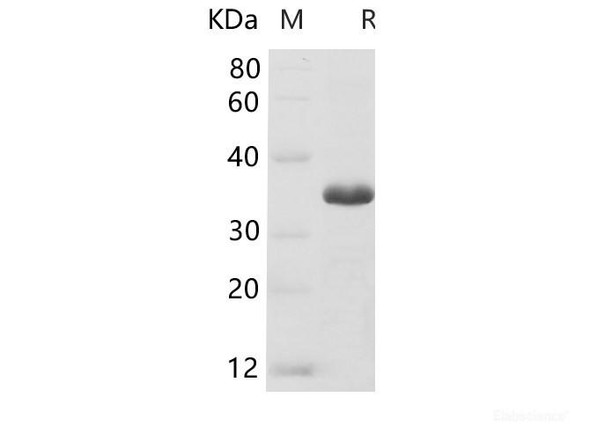Description
| Product Name: | Human GAPDH Recombinant Protein |
| Product Code: | RPPB1672 |
| Size: | 10µg |
| Species: | Human |
| Target: | GAPDH |
| Synonyms: | G3PD, GAPD, MGC88685, GAPDH, Glyceraldehyde-3-Phosphate Dehydrogenase. |
| Source: | Escherichia Coli |
| Physical Appearance: | Sterile filtered colorless solution. |
| Formulation: | The GAPDH protein (1 mg/ml) contains 20mM Tris-HCl buffer pH-8, 1mM EDTA, 1mM DTT and 20% glycerol. |
| Stability: | Store at 4°C if entire vial will be used within 2-4 weeks. Store, frozen at -20°C for longer periods of time. For long term storage it is recommended to add a carrier protein (0.1% HSA or BSA).Avoid multiple freeze-thaw cycles. |
| Purity: | Greater than 95.0% as determined by SDS-PAGE. |
| Amino Acid Sequence: | MGKVKVGVNG FGRIGRLVTR AAFNSGKVDI VAINDPFIDL NYMVYMFQYD STHGKFHGTV KAENGKLVIN GNPITIFQER DPSKIKWGDA GAEYVVESTG VFTTMEKAGA HLQGGAKRVI ISAPSADAPM FVMGVNHEKY DNSLKIISNA SCTTNCLAPL AKVIHDNFGI VEGLMTTVHA ITATQKTVDG PSGKLWRDGR GALQNIIPAS TGAAKAVGKV IPELNGKLTG MAFRVPTANV SVVDLTCRLE KPAKYDDIKK VVKQASEGPL KGILGYTEHQ VVSSDFNSDT HSSTFDAGAG IALNDHFVKL ISWYDNEFGY SNRVVDLMAH MASKE |
| Biological Activity: | Specific activity is > 90 units/mg, and is defined asthe amount of enzyme that convert 1.0 umole of glyceraldehyde-3-phosphate to 1,3-Bisphosphoglycerateper minute at pH 8.5 at 37C. |
GAPDH is a catalytic enzyme normally known to play a role in glycolysis. GAPDH exists as a tetramer composed of 36-kDa subunits and has a range of intracellular functions. GAPDH catalyzes the reversible reduction of 1,3-bisphosphoglycerate to glyceraldehyde 3-phosphophate in the presence of NADPH. Besides functioning as a glycolytic enzyme in cytoplasm, GAPDH has function in intracellular processes such as membrane fusion, microtubule bundling, phosphotransferase activity, nuclear RNA export, DNA replication and DNA repair. GAPDH catalyzes a vital energy-yielding step in carbohydrate metabolism, the reversible oxidative phosphorylation of glyceraldehyde-3-phosphate in the presence of inorganic phosphate and nicotinamide adenine dinucleotide (NAD). The enzyme exists as a tetramer of identical chains.
GAPDH Human Recombinant produced in E. coli is a singlepolypeptide chain containing 335 amino acids (1-335) and having a molecularmass of 36kDa. The GAPDH is purified by proprietary chromatographictechniques.
| UniProt Protein Function: | GAPDH: a multifunctional enzyme with both glyceraldehyde-3-phosphate dehydrogenase and nitrosylase activities. A key glycolytic enzyme that catalyzes the first step of the pathway by converting D-glyceraldehyde 3-phosphate (G3P) into 3-phospho-D-glyceroyl phosphate. An important enzyme for energy metabolism, and the production of ATP and pyruvate through anaerobic glycolysis in the cytoplasm. Additionally, it participates in apoptosis, membrane trafficking, iron metabolism, nuclear activities and receptor mediated cell signaling. Its subcellular localization changes reflecting its multiple activities. Is cytosolic, but is also localized in the membrane, the nucleus, polysomes, the ER and the Golgi. Participates in transcription, RNA transport, DNA replication and apoptosis. S-nitrosylation on Cys-152 following apoptotic stimulates its interaction with SIAH2, which in turn moderates its translocation into the nucleus. Mediates cysteine S-nitrosylation of nuclear target proteins including SIRT1, HDAC2 and DNA-PK. Deregulated in lung cancer, renal cancer, breast cancer, gastric cancer, glioma, liver cancer, colorectal cancer, melanoma, prostatic cancer, pancreatic cancer and bladder cancer. Its increased expression and enzymatic activity is associated with cell proliferation and tumorigenesis, Oxidative stress impairs GAPDH catalytic activity and leads to cellular aging and apoptosis. In experimental animal models, injection of GAPDH antagonists induces apoptosis and blocks Hep3B tumor progression, suggesting a therapeutic potential of targeting GAPDH in human hepatocellular carcinoma |
| UniProt Protein Details: | Protein type:Oxidoreductase; EC 1.2.1.12; Carbohydrate Metabolism - glycolysis and gluconeogenesis Chromosomal Location of Human Ortholog: 12p13 Cellular Component: microtubule cytoskeleton; nuclear membrane; membrane; intracellular membrane-bound organelle; perinuclear region of cytoplasm; cytoplasm; plasma membrane; lipid particle; cytosol; ribonucleoprotein complex; nucleus; vesicle Molecular Function:identical protein binding; protein binding; microtubule binding; glyceraldehyde-3-phosphate dehydrogenase (phosphorylating) activity; NADP binding; NAD binding Biological Process: neuron apoptosis; glycolysis; protein stabilization; negative regulation of translation; carbohydrate metabolic process; glucose metabolic process; pathogenesis; microtubule cytoskeleton organization and biogenesis; gluconeogenesis |
| NCBI Summary: | This gene encodes a member of the glyceraldehyde-3-phosphate dehydrogenase protein family. The encoded protein has been identified as a moonlighting protein based on its ability to perform mechanistically distinct functions. The product of this gene catalyzes an important energy-yielding step in carbohydrate metabolism, the reversible oxidative phosphorylation of glyceraldehyde-3-phosphate in the presence of inorganic phosphate and nicotinamide adenine dinucleotide (NAD). The encoded protein has additionally been identified to have uracil DNA glycosylase activity in the nucleus. Also, this protein contains a peptide that has antimicrobial activity against E. coli, P. aeruginosa, and C. albicans. Studies of a similar protein in mouse have assigned a variety of additional functions including nitrosylation of nuclear proteins, the regulation of mRNA stability, and acting as a transferrin receptor on the cell surface of macrophage. Many pseudogenes similar to this locus are present in the human genome. Alternative splicing results in multiple transcript variants. [provided by RefSeq, Nov 2014] |
| UniProt Code: | P04406 |
| NCBI GenInfo Identifier: | 120649 |
| NCBI Gene ID: | 2597 |
| NCBI Accession: | P04406.3 |
| UniProt Secondary Accession: | P04406,P00354, Q53X65, E7EUT4, |
| UniProt Related Accession: | P04406 |
| Molecular Weight: | Calculated MW: 31kDa/36kDaObserved MW: 36kDa |
| NCBI Full Name: | Glyceraldehyde-3-phosphate dehydrogenase |
| NCBI Synonym Full Names: | glyceraldehyde-3-phosphate dehydrogenase |
| NCBI Official Symbol: | GAPDH�� |
| NCBI Official Synonym Symbols: | G3PD; GAPD; HEL-S-162eP�� |
| NCBI Protein Information: | glyceraldehyde-3-phosphate dehydrogenase; aging-associated gene 9 protein; peptidyl-cysteine S-nitrosylase GAPDH; epididymis secretory sperm binding protein Li 162eP |
| UniProt Protein Name: | Glyceraldehyde-3-phosphate dehydrogenase |
| UniProt Synonym Protein Names: | Peptidyl-cysteine S-nitrosylase GAPDH (EC:2.6.99.-) |
| UniProt Gene Name: | GAPDH�� |
| UniProt Entry Name: | G3P_HUMAN |








